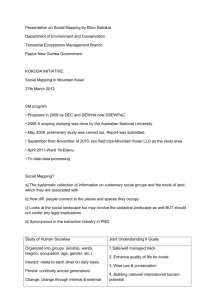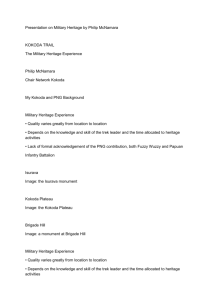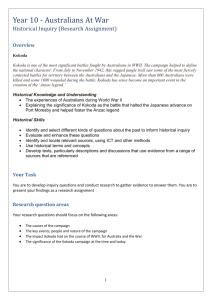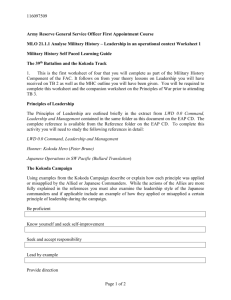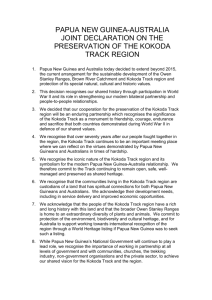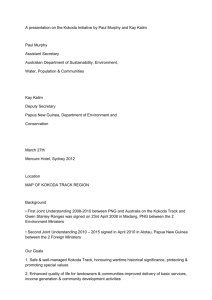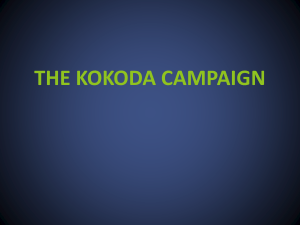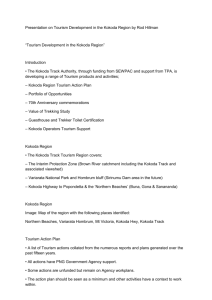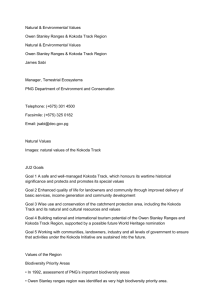report on kokoda track authority awareness patrol
advertisement
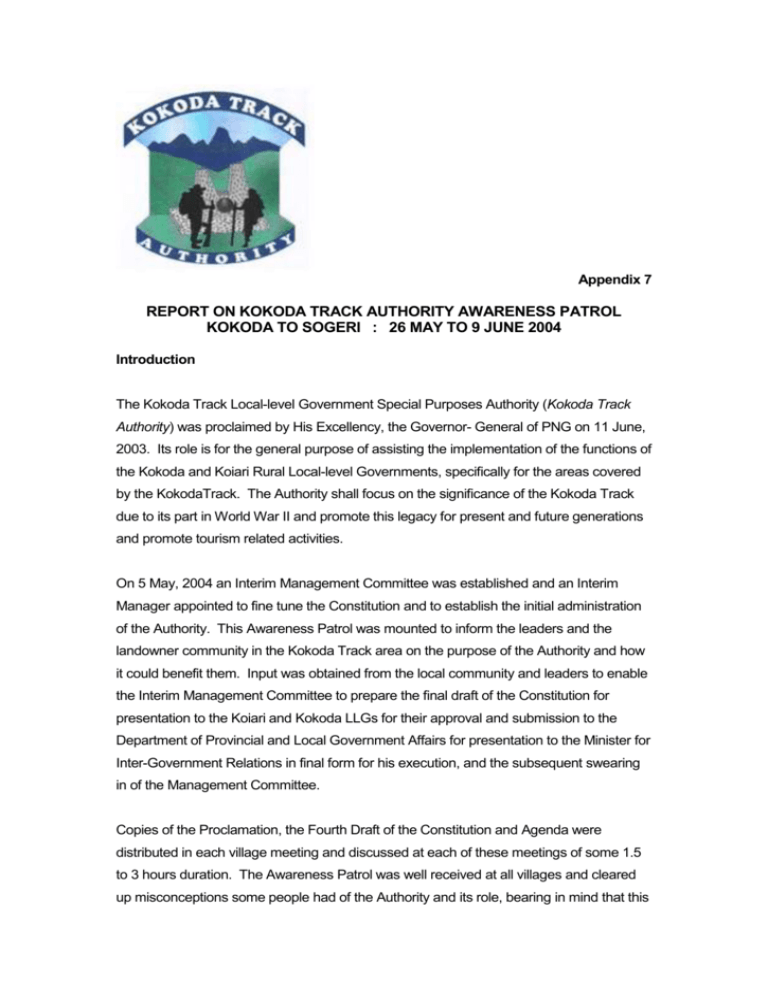
Appendix 7 REPORT ON KOKODA TRACK AUTHORITY AWARENESS PATROL KOKODA TO SOGERI : 26 MAY TO 9 JUNE 2004 Introduction The Kokoda Track Local-level Government Special Purposes Authority (Kokoda Track Authority) was proclaimed by His Excellency, the Governor- General of PNG on 11 June, 2003. Its role is for the general purpose of assisting the implementation of the functions of the Kokoda and Koiari Rural Local-level Governments, specifically for the areas covered by the KokodaTrack. The Authority shall focus on the significance of the Kokoda Track due to its part in World War II and promote this legacy for present and future generations and promote tourism related activities. On 5 May, 2004 an Interim Management Committee was established and an Interim Manager appointed to fine tune the Constitution and to establish the initial administration of the Authority. This Awareness Patrol was mounted to inform the leaders and the landowner community in the Kokoda Track area on the purpose of the Authority and how it could benefit them. Input was obtained from the local community and leaders to enable the Interim Management Committee to prepare the final draft of the Constitution for presentation to the Koiari and Kokoda LLGs for their approval and submission to the Department of Provincial and Local Government Affairs for presentation to the Minister for Inter-Government Relations in final form for his execution, and the subsequent swearing in of the Management Committee. Copies of the Proclamation, the Fourth Draft of the Constitution and Agenda were distributed in each village meeting and discussed at each of these meetings of some 1.5 to 3 hours duration. The Awareness Patrol was well received at all villages and cleared up misconceptions some people had of the Authority and its role, bearing in mind that this Authority (unlike many others in PNG) proposes to keep its administrative costs to a minimum and provide village infrastructure development in the communities using revenue from Trek Permit Fees and funds from donor agencies with self help and some cash (where appropriate) contribution from the communities. The Awareness Team Interim Management Committee Members: Alfred Amuli Kokoda LLG rep (Chairman) Norris James Koiari LLG rep (V/Chairman) David Soru Kokoda LLG landowner rep Garry Imiri Koiari LLG landowner rep Alex Rama Alternate Tour Operator rep (Naduli) Warren Bartlett Interim Manager(ex-officio member) Local Level Government Councillors: Lance Lovi Kovelo Ward, Kokoda LLG Willie Vave Efogi Ward, Koiari LLG John Daku Manari Ward, Koiari LLG Babea Mado Vesulogo Ward, LLG Porters : 8 porters from KokodaTrack area It was proposed that Assistant District Administrator officers Tony Abavu from Sogeri and Terrence Baurimae from Kokoda accompany the patrol but apologies were tendered due illness in one family and work commitments for the other. The Actual Awareness Program Wed 26 May Fly to Kokoda on Air PNG. Brief talks with Kokoda leaders and community members pending meeting with LLG, which was deferred till Thurs morn. Visited Kokoda memorial sites and museum, police station, district office and Kokoda Memorial Hospital. Accom: David Soru Guest House 2 Thu 27 May Meeting with Kokoda LLG President 8.30 – 9.30 then walked to Kovelo (1 hour). Welcome singsing at Kovelo then awareness meeting (2.5 hours) and lunch. Walked to Hoi (45 min). Awareness meeting at night with Hoi elders (1.5 hours) Accom: Hoi Guest Houses Fri 28 May Walked to Isurava in rain (5 hours), meeting with Isurava villagers (1.5 hours), lunch and walked to Isurava Memorial and Alola (3 hours). Held awareness meeting at night for Alola and Abuari villagers (2 hours). Accom: Alola Guest Houses. Sat 29 May Walked from Alolo to Templeton #2 Crossing (8 hours). Camped adjacent new iron walled & roofed guest house under construction. Camp: Templeton 2 Crossing Sun 30 May Walked from Templeton 2 to Kagi (8.5 hours). Awareness meeting at Kagi for Kagi and Boridi wards (2.5 hours). Accom: Kagi Guest Houses Mon 31 May Inspected Kavovo school and projects. Held second meeting with Kagi, Naduri and Maraba villagers (2 hours). Walked to Efogi 2 (Launumu) and Efogi 1 (3 hours). Welcome and refreshments. Conducted awareness meeting (1.5 hours) and adjourned till next morning. Accom: Efogi Guest Houses Tue 1 Jun Resumed Efogi meeting (1.5 hours). Walked from Efogi to Manari (5 hours). Held meeting (1 hour) and adjourned till next morning. Accom: Manari Guest Houses. Wed 2 Jun Resumed Manari meeting (2 hours). Walked to new Naoro Village (5 hours). Conducted meeting in evening (3 hours). Accom: New Naoro Guest Houses Thu 3 Jun Walked Naoro village to Ua’ule Creek, lunch at new Guest House then walked 1 hour to camp site (9 hours). Reviewed results of awareness meetings in evening. Camp: Lower Imita Ridge Campsite 3 Fri 4 Jun Walked 2 hours to Imita Ridge then Goldie River, Owers Corner (total 5 hours). Stopped at Girinumu Village for brief awareness meeting (1.5 hours), then walked on to Red Shield Army and Vesulogo to meet transport to Riverside Store arriving at 4.00pm. Barbecue and accom Riverside Store. Sat 5 Jun Porters paid off. Port Moresby visit and porters drop off, then in afternoon guided tour of Rouna #1 Hydro Scheme Turbine Room and Varirata National Park. Accom: Riverside Store. Sun 6 Jun Visited Vesulogo Village for awareness meeting in morning (2.5 hours) and lunch. Returned to Depo for meeting in afternoon with poor attendance of only 8 representatives (1 hour). Transport of remaining Awareness Team members to Port Moresby in afternoon. Wed 9 Jun Attended meeting of Depo Ward community leaders and villagers for awareness with approx 50 in attendance (2.5 hours). The Interim Manager officiated at this meeting with assistance of Councillor David Asi and Narai Billy. End of Awareness Patrol BUSINESS AS PER AGENDA 1. Open Meetings: All awareness meetings were opened and closed with prayer as was grace offered with all meals. A brief address was given by the Chairman introducing the Awareness Team members, and the reason and procedures for establishing the Kokoda Track Authority. This was further expanded on by the Interim Manager in Pidgin English and translated into Police Motu and/or Koiari language by one of the team members. 2. Proclamation and Constitution: 4 a) The Area of Authority per clause 2 of the Constitution was discussed in each ward meeting and the villages in the wards prioritized for benefits from the Authority due to their proximity to the track as follows: Koiari Rural Local-level Government Ward 5 (DEPO) comprising the villages of Depo (Mageri), Manurinimu, Ianabewai, Maketawai and Bisitabu; (no changes) and Ward 6 (VESULOGO) comprising the villages of Vesulogo No.1, Vesulogo No.2, Morenarovo, Girinumu, Uberi No.1, Uberi No.2, the institutions of Red Shield Army, Ilolo Plantation, Bisianumu Plantation, and Girinumu Plantation; (note five new inclusions) and Ward 15 (BODIRI) comprising firstly the village of Bodinumu and the institution of Bodinumu Primary School, and secondly the villages of Daoi and Bodiri (Boridi); (no changes) and Ward 16 (KAGI) comprising the villages of Kagi, Naduri, Maraba, Myola, and the institution of Kavovo Primary School; (note new inclusion of Maraba village) and Ward 17 (EFOGI) comprising firstly the villages of Efogi No.1, Efogi No.2 (Launumu) and Enivilogo and secondly the village of Hagelogo; (no changes) and Ward 18 (MANARI) comprising firstly the villages of Manari, Loni, Naoro and Ioribaiwa, and secondly the villages of Hogelo (Ebologo), Madilogo and Manalogo. (no changes) Kokoda Rural Local-level Government Ward 1 (ASIMBA) comprising the villages of Kanga, Asimba, Karukaru, Sungeina, Gorovaki and Korogo; (note village priority removed and two extra villages) and Ward 2 (KOBRLO) comprising firstly the Villages of Kovelo No.1 and Kovelo No.2 (Hoi), and secondly the villages of Savaia and Ebel (Ebei); (no changes) and 5 Ward 4 (AMADA) comprising firstly the village of Botue and Manua, and secondly the villages of Saga and Amada; (change of priorities and one extra village) and Ward 5 (KOKODA STATION) comprising the villages of Kokoda No.1, Kokoda No.2, Kokoda No.3 and the institution of the Seventh Day Adventist Church; (note Kokoda Plantation Portions relocated to new Ward 6) and Ward 6 (KOAGEA BLOCK) comprising Kokoda Plantation Portions 18, 35, 38, 39, 153, 189, 191, and LA2379, 3071, and Portions 161 – 188; (note new ward insertion in amended Proclamation and Constitution, Kokoda Plantation being previously included in Ward 5) and Ward 7 (KEBARA) comprising firstly the village of Kanandara, and secondly the villages of Kebara, Pirive, Kamondo and Sengi; (no changes) and Ward 8 (ABUARI) comprising the villages of Abuari, Hagutava, Kaile and Pelai; (no changes) and Ward 9 (ALOLA) comprising the villages of Alola and Isurava; (no changes) and Ward 10 (WAJU) comprising the villages of Waju, Sisireta, Havaki, Onseta (Hovea) and Gorari. (no changes) For Ward 6 (KOAGEA BLOCK) to be inserted in the Proclamation and the Constitution, there will need to be a resolution of the Kokoda LLG requesting such amendment and Dept of Provincial and Local Level Government Affairs arrange for the necessary amendment to the Proclamation to be approved by the Minister for Inter-Government Relations for assent by the Governor-General. KTA management can assist with the preparations for any such amendment. b) The Management Committee as per clause 4 of the Constitution was discussed in each ward meeting and concern was voiced both on the Koiari side and the Kokoda side on insufficient representation of landowners, particularly in relation to the Koiari grasslands people from Girinumu to Vesilogo to Depo; and with the Kokoda people from the Lower Kokoda area. 6 The two Koiari LLG nominees come from Manari and Kagi villages and the two Kokoda LLG nominees come from Alola and Abuari villages, all being from the mountain areas and none from the lowlands. It was explained that in the initial stages of drafting the Proclamation, there were three reps suggested for each LLG (one representing the LLG and two representing landowners), but to provide space for nominees from the Tourism Promotion Authority, National Cultural Commission, Tour Operators and Returned Services League, it was probably the wrong decision to reduce the number of landowners representatives on the management committee. In discussions with the Dept of Provincial and Local Government Affairs, it is possible to increase the number of persons appointed by each LLG to represent landowners from one to two. The aggrieved wards were advised to nominate suitable candidates to represent the lowlands areas and to have their Ward Councillors refer the nominations to the next meetings of the Koiari and Kokoda LLGs so that the LLGs can resolve to make a request to the Minister to amend the Proclamation to increase the landowner reps. KTA management can assist with the preparations for any such amendments. There was also discussion on the manner in which the LLG reps were appointed by the LLGs. The Kokoda LLG had allocated funds for a preliminary awareness in their area to advise the people of the proposed Kokoda Track Authority and to obtain nominations for the two positions, which the LLG considered at a full meeting and determined their appointees. The Koiari LLG did not have funds available for a similar preliminary awareness in their area resulting in some disagreement being expressed over the suitability of their present two representatives, mainly being city based and one with previous Koiari Development Authority history. Under Clause 5 of the Constitution, the term of membership of the Management Committee shall be for a period of five years, but the person or body appointing the member may review the appointment annually. It was recommended at all the awareness meetings that the present LLG appointed representatives be given a chance to prove their capabilities and allow the Authority to develop to serve the Kokoda Track community; and that such appointments be reviewed in 12 months time. 7 There was also some concern expressed over the nominee for the Tour Operators in that the person nominated should be actively involved as a trekking tour operator who physically knew the Kokoda Track, whereas the nominee of Garry Seddon, President of PNGTIA was a car hire manager, and the other nominee of Alex Rama was a Trekking Guide from Naduli without the management experience. Such information will be put to the Tour Operators for their consideration. c) The Functions of the Authority per clause 15 of the Constitution were discussed in each ward meeting and appeared to be understood and well accepted. There was some concern expressed that some donor agencies who supply materials and labour expertise (e.g. Rotary International) may not wish to pay project funds to KTA, but prefer to utilize the services of KTA as facilitators. There would appear to be no problem with such arrangement and therefore clause 15.(d) be amended to read as follows: “15.(d) administer, facilitate, ensure and or oversee the implementation of the developments and other projects in the Kokoda Track Area: “ It is proposed that the Authority have internet exposure through various websites such as PNG Tourism Authority, Kokoda Track Foundation and possibly its own website, the various possibilities to be explored. Such would assist promoting trekking of the Track and provide access for various KTA registered tour operators to obtain trekking clients. It is also proposed that projects which Koiari Special Purpose Authority have made application for on behalf of Kokoda Track communities, be transferred to KTA for follow up action on application funding and implementation in conjunction with donor agencies such as Community Development Scheme, AusAid, Rotary International, etc. Other functions under this heading are more clearly defined under the general agenda items below. 8 d) Staff of the Authority per clause 20 of the Constitution was discussed in that the only employee at the present being the interim manager for the three months interim period for conduct of the awareness patrol, fine-tuning of the Constitution and establishment of administrative and accounting systems. Once the Minister has approved the full Constitution and sworn in the Management Committee, it was envisaged that there would be a small staff as follows: * Manager / Executive Officer at Sogeri for overall administration of the Authority including duties in Port Moresby, Sogeri, Kokoda and the Track areas. * Liaison Officer / Assistant Manager at Sogeri or Port Moresby office for administration, issue and checking of Trek Permits, liaison with Tour Operators, Guides, Track communities by radio and visits, oversighting Track Memorials and parks, etc. * Liaison Officer at Kokoda office for administration, issue and checking of Trek Permits, liaison with Tour Operators, Guides, Track communities by radio and visits, oversighting Kokoda Memorial Park and Museum, etc. * Liaison Officer / Ranger at Efogi Village to check on Trek Permits of all trekkers including those originating from Sogeri, Kokoda or Brown River and checking on maintenance of Kokoda Track and airstrips, etc. * Ranger at Ower’s Corner once Sogeri – Ower’s Corner road is upgraded and an Information Hut is constructed to provide liaison and check Trek Permits and track maintenance, etc. It was recommended that the administrative staff and overheads of the Authority be kept to a minimum to allow maximum funding of development projects for the Kokoda Track communities. e) Finance for the Authority per part IV of the Constitution was briefly discussed with the main income source being estimated through Trek Permit Fees and Donor Agency grants for infrastructure projects. It was proposed that application be made to Northern and Central Provincial Governments through the Koiari and 9 Kokoda LLGs for grants for the first year to enable the administration to be adequately established without using trekking fees. Two bank accounts have been established with BSP Douglas Street, Port Moresby branch titled Kokoda Track Authority – Operating A/c, and Trek Permit Fee A/c. K62,795 has been transferred from PNGTIA representing Trek Permit fees collected since 2002 and an estimated similar amount is awaited from Niugini Tours Pty Ltd in Sydney who have been collecting Trek Permit fees and holding the funds in trust since 2001. f) Other Matters in Relation to The Constitution were mainly of standard administrative nature and not necessary to be discussed. Copies of the Fourth Draft of the Constitution were left with Ward Councillors for their reference and discussion if any matters arose. 3. Trek Permit Fees: Trek Permit fees set in 2001 and continuing to date have been K100.00 per international trekker or non-citizen in PNG whilst citizen trekkers have been K50.00 and students 50% of the normal rate. There is no charge for residents of the Kokoda Track area. At all meetings the trek fee amount was discussed and all recommended that the Authority, with the approval of the Kokoda and Koiari LLGs, double the rates. With present currency exchange rates K200 permit fee is AU$90.00, which Australian trekkers will accept. Councillor Lance Lovi of Kovelo Ward Kokoda LLG gave a keynote address at all meetings explaining the reasons for the closure of the Track in 2000. Some K128,000 in trekking fees has been collected since the re-opening of the Track in 2001 to date by Niugini Tours and PNGTourism Industry Association Inc. If such fees had been introduced 63 years earlier, there would have been millions of Kina collected and put towards community infrastructure developments. All communities voiced approval that all trekking fees held in trust since 2001, together with ongoing trekking fees, must be collected by Kokoda Track Authority and their authorized agents. Such funds are to be put towards Community Infrastructure Development Projects supplemented with funds from donor agencies and Government contributions. 10 To encourage non-citizen residents of PNG to walk the Track, the new Trek Fee of K100 applies to both citizen and non-citizen trekkers, with 50% discount for students. No Trek Fee is applicable for Kokoda Track residents. Special Trek Fee rates will be determined for short treks, including one day treks. The Trek Leader is not charged a Trek permit Fee, but should obtain a Permit to ensure his accepted passage over the Track. With an estimated 1,000 Australian trekkers in one year at K200 per person, K200,000 will be raised. An estimated 500 PNG resident trekkers in one year will provide an extra K50,000. Books of 50 forms Kokoda Track Authority Trek Permits in triplicate are planned to be printed, with each trekker receiving a permit upon payment of the fee. Recognized Tour Operators will be issued with a supply of these accountable form books, and issue the permit when their client pays for their tour. The Tour Operators will be required to perform a regular reconciliation of their Trek Permit issues and deposit the funds in the KTA Trek Permit Fee bank account with a copy of the permits being mailed to KTA for accountability and recording in the Register of Trekkers which will be maintained by the Authority. The original Permit Form will allow the trekker to obtain a village rubber stamp impression at each village as proof of walking the Kokoda Track. Such will provide the trekker a memento of his travels. On the reverse of the original Permit form will be “Guidelines for Walking the Kokoda Track”. 4. Registration of Tour Operators with the Authority: It is recommended that all Tour Operators, who presently send or plan to send individuals or groups on treks of the Kokoda Track, register with the Authority. A form will be supplied requesting details of the Tour Operator organization, contact person, address, phone, fax, email, website, etc. Such information of Kokoda Track Tour Operators can be utilized in the Kokoda Track Authority Website which will enable potential trekking clients to contact smaller Tour Operators. Also required from Tour Operators and others will be details of any base station or hand held radio transceiver, which utilizes the Kokoda Track radio communication network. 5. Tour Operators to Advise the Authority of their Trekking Program: To assist with the co-ordination of trekking groups over the Kokoda Track and to ensure that 11 Guest House accommodation is not stretched to the limit, Tour Operators will be requested to supply the Authority with their Trekking Program and number of trekkers and porters so that guest house bookings can be co-ordinated through the Authority and Tour Operators advised if there are any over-bookings. Community leaders advised that villages from Hoi to Depo were devoted Seventh Day Adventist followers and that trekkers must not interfere with their daily devotion times of 5.00 pm to 6.00 pm, whilst most would appreciate no trekkers in their villages on their Sabbath which commences at 5.00pm on Friday night and finishes at 6.00 pm on Saturday night. Tour Operators may have to review their trekking itineraries to encompass such requests and have trekkers camp away from the villages on the Sabbath if a rest day is not programmed. The main thing is that trekking groups show respect towards the communities’ religious beliefs for the sake of well-being of all parties. 6. Regulation and Improvement of Radio Communications: The present radio communication network for the Kokoda Track villages was established by the National Cultural Commission. The Australian High Commission has funded and installed some 20 solar or mains powered VHF Base Stations and upgraded Mt Fala Repeater Station. The Pangtel licence for the Repeater and some base and handheld radios is currently held and paid by National Cultural Commission. It is planned that the Authority takes over the responsibility of the Radio Network from NCC, complies with Pangtel licencing requirements and regulates the issue and use of present and future radios. The Authority would also be responsible for the maintenance of the Mt Fala Repeater equipment and the Kokoda Track village base radios. The present radio network is overloaded resulting in the Repeater batteries cutting out on low voltage during times of heavy use and bad weather. The possible installation of a Wind Generator at Mt Fala would improve battery charge for transmission availability if funding for such equipment was available. All Tour Operators and others will be requested to supply details of any base station or hand held radio transceiver, which utilizes the Kokoda Track radio communication network. Information required will be the company, organization or person with the radio, radio brand and type, model, serial number and call sign details. 12 All base station radios were checked from Kokoda to Sogeri and were operating except for the Kovelo Base Radio which has not been working since August 2003. During the next visit to Kovelo, keys for the radio box will be taken and used to open the radio box, check for faults, fix if possible, otherwise the box be unbolted from the wall and sent to Port Moresby for radio repair. The Health base station radio at Kagi Aid Post was not working and was taken by our Team and delivered to Mr Steve Groves at Dept of Health Radio Workshop at Aopi Centre for repair and return to Kagi. 7. Guide and Porter Registration with the Authority: The Kokoda Track communities want first preference employment of guides and porters to be given to Kokoda Track young and medically fit Koiari men. To assist in achieving this request, the Authority proposes that all guides and porters register with the Authority. Details of their name, village, age (date of birth), years or number of treks experience, any training courses attended, tour operators with whom they have worked, etc. will be recorded. The Authority (with its database and radio communication with most villages) should be able to help tour operators obtain their guides and porters. The recent trend of some guides to have prospective porters register with them for a fee is to be discouraged as such creates animosity between porters and those who do not receive jobs. The Authority will also arrange with PNG Tourism Promotion Authority and other organizations for training courses to be conducted for porters, guides and aspiring persons to progress to local Tour Operators. First Aid training for guides can be organized with St John’s Ambulance Brigade and it is recommended that all Tour Guides carry a First Aid Kit for treating of basic ailments and injuries of trekkers and porters. It was suggested that recognized Kokoda Track guides and porters be graded for level of competence (Grade 1, 2, 3, etc) and supplied with ID cards. It was also suggested that there be some guidelines created for pay rates of guides and porters and that casual rates also be set for village to village porters, where repatriation is by foot back to the place of engagement instead of aircraft to/from either Kokoda, Port Moresby or Mount Koiari ports. 8. Action Plans for Wards in conjunction with LLG Five Year Plans: At all meetings, the community leaders and villagers were requested to provide a list of 13 community development projects which the Authority could consider in conjunction with the Kokoda and Koiari LLGs Five Year Development Plans and seek out donor funding with counterpart funding from the community and Trekking Fee revenue. It would appear that a number of smaller projects should be possible through AusAid’s Community Development Scheme, whilst funding for the bigger projects can be sought from the National or Provincial Governments and donor Agencies such at Kokoda Track Foundation, AusAid, Rotary International, foreign embassies, etc. Refer attachment for Action Plans in respect of each Ward and or village obtained during the Awareness Patrol. 9. Village Census Book Implementation: The Kokoda Local-level Government (under the present reforms) has implemented the Census Book as supplied by the Department of Provincial and Local Government Affairs. The LLG employs a Village Recorder in each Ward to write up the Book and maintain it. For such, the Village Recorder receives K40 per month. It is proposed that such Village Recorder also be responsible for stamping all Trek Permits with the Village Stamp, for which the Authority can budget to top up his monthly allowance in the villages where such stamp will be used. Kovelo village Census Book is full and a new book has been requested, which will be sent to Kokoda for the Kovelo Village Recorder next week. The Koiari LLG has not implemented such Census Books to date. The Authority can assist the Koiari LLG introduce the Census Books in the Kokoda Track villages and arrange in conjunction with Dept of Provincial and Local Government Affairs for the training of prospective Village Recorders. Such books will assist with the identification of Koiari prospective guides and porters as well as provide an accurate census of the village population, which can also be used for the updating of the future Common Roll for the area. 10. Guest House Availability, Quality and Administration: There are a number of new Guest Houses, which have been or are currently being constructed, both in and nearby villages and some in campsite locations. Communities and individuals should not rush into constructing new guesthouses unless their location away from the villages has been discussed with Tour Operators and the Authority. There is no 14 objection for the construction of new guest houses to replace old but too many guest houses in villages could result in low or nil occupancy for some. The communities were advised that trekkers preferred bush material guesthouses as such added atmosphere to their trek. Most trekkers were not in favour of iron sheds or even iron roofs on guesthouses. Some trekkers preferred to have a couple of nights in tents in the bush campsites instead of guesthouse accommodation. There are new guesthouses recently completed or under construction at Modulu Hamlet, Hoi Village, Deniki Battle Camp site, Alolo side of Isurava Memorial, Templeton #2 Crossing (iron walls & roof), Brigade Hill, New Naoro village (x2) and Ua’ule Creek. The Isurava Memorial iron walled & roof guesthouse has had its padbolt and lock removed by a trekking group as the building was locked. A replacement lock will be supplied to avoid contents of mattresses and pillows being stolen with the landowner caretaker being the custodian of the key. Most Guest Houses on the Kokoda Track are privately owned. It was suggested that Tourism Promotion Authority assist with the provision of Guest House owner/manager training in the role of guest house keeping, maintenance, book-keeping, etc. It may be preferable to have one large community guesthouse in the trekking villages. It was suggested that all guesthouses register with KTA and a registration form will soon be distributed to owners of all existing guest houses and those under construction. The Authority can assist with the marketing of guesthouses for long or short trek visits and co-ordinate the bookings for guesthouses from itineraries supplied to the Authority by Tour Operators and from small groups or individuals when they pay their Trek Permit Fee. It was suggested that Guest House fees be standardized at K20 per person per night and K5 per guide or porter. Such would provide reasonable income for owners of new guesthouses and income for maintenance or upgrading of older guesthouses. Washing facilities at guest houses should be improved where the village has a water supply with the provision of a shower rose or high level tap in a simple walled area for privacy of the bathers. There should also be a bench or dry area nearby where clothes, towels, etc can be placed. In washing areas, including collection of water and 15 washing of plates and dishes, etc, the ground should be dry, stoned or timber decked and not muddy. Toilet facilities of the standard pit latrine should be clean and of reasonable size so that the trekker can stand upright. It is hoped that a simple vented pit latrine used in National Parks in parts of Australia can be modified for use in Kokoda Track villages in the future. 11. Maintenance of Kokoda Track: The Kokoda Track was in reasonable condition. Numerous treefalls and land slips need to be cleared. Temporary track diversions skirt these areas. In the past the Local Government Councils had a community workday set aside for maintenance of villages and clearing of village access tracks. This works only to a limited extent these days. With Village Courts now in operation in the Kokoda Track Area, community work in clearing parts of the Kokoda Track could be handed down as penalties by the Village Court. It is planned that a MOA be established between the Northern and Central Provincial Governments for funds to be made available for the clearing of the Kokoda Track. Approaches will also be made to the Kokoda and Koiari LLGs for assistance with funding maintenance of the Track. When funds are available from the PGs, LLGs and possibly some Trek Fee income, maintenance can be budgeted for tree-fall and landslip clearing, river crossing log bridges, etc. There are also plans for various construction projects, including the construction of footbridges over various creek and river crossings through the Australia / PNG joint funded Kokoda Trail Development Project. Counterpart funding of some K9 million by the PNG Government is still awaited to complete the program. Further negotiations for funding of such projects will be continued by the Authority with National Cultural Commission. Because of the changing course of the Naoro River, Naoro villages suggested the possibility of a dinghy with outboard motor to ferry trekkers and villagers across the widest and deepest sections of this river. Such would be in preference to a 16 footbridge, but the logistics of servicing a dinghy or canoe would be somewhat of a feat in itself. 12. Airstrip and Road Maintenance and Upgrading: To promote trekking and tourism in the area, it is necessary for four existing Mt Koiari airstrips to be maintained and upgraded where possible. These airstrips are Efogi, Kagi, Manari and Naduli. New airstrips at Alola and Abuari currently under construction and funded by the Northern Provincial Government will also need regular maintenance once officially opened. It was suggested that application be made to Community Development Scheme for part funding of four lawnmowers and that the Authority hire mower operators and supply an estimated 40 litres of petrol per month to keep the existing four airstrips grass cut. In the case of Efogi, it may be worthwhile having an Aesop volunteer surveyor survey this strip and have manual labour or a bobcat cut the humps out of the strip and fill the hollows. Such equipment could be part of a Defence Force exercise for Efogi and maybe other airstrips. Work on upgrading Myola and Naoro airstrips would need further consideration, once the present Myola land dispute is settled and once the Naoro people settle down at their final new village location and determine the need, if any, of having an airstrip at Naoro. Upgraded and maintained airstrips will encourage the recommencement of scheduled flights into this area and assist with short trekking plans, agricultural crops to Port Moresby markets and improved services to the community in store goods and other supplies, etc. Depo to Ower’s Corner road needs urgent upgrading as 4WD vehicles cannot progress past the Salvation Army camp due to deep wheel ruts and potholes. It is believed that some K100,000 overseas funding with K100,000 PNG counterpart funding for basic rectification work on this road is forthcoming. Once contracts have been let and this work is completed it will be necessary for regular maintenance of drains, ruts and potholes to prevent the road from becoming impassable again. 13. Memorials, Museums, Historic Sites and War Relics: The Authority should maintain memorials, and where appropriate, pay a caretaker to keep the memorial and surrounding grounds neat and tidy. In the case of Kokoda Memorial Park, the 17 Authority should get title to the land or an assignment from the present department for the Authority to maintain the park and administer the Museum, thereby improving the display of war relics. The small house adjoining the Museum could become the Authority’s Kokoda office, although there are other office opportunities through the Kokoda LLG and the Department of Environment and Conservation (formerly National Parks & Wildlife). The Isurava Memorial Park can be maintained by the Authority, with assignment and possible part funding by the Australian War Graves Commission. A similar situation would possibly apply with the Ower’s Corner memorial. Fees should not be charged by landowners for visitors to visit memorials. KTA should pay a landowner or contractor to maintain the memorial and surrounding grounds. Interested landowners can open up safe war relic sites, eco-tourism attractions, maintain the track to them and charge visitors an entrance fee. Village museums are also privately owned and owners can charge an admittance fee to visitors. It is proposed that KTA identify historic war sites with plaques or signboards, have track arrows and distances between villages and points of interest. The landowner at Brigade Hill has currently fenced the memorial site, constructed a by-pass road and erected a guesthouse adjoining the memorial plaque. He is charging K5 per visitor to the memorial site and K15 per night for guesthouse accommodation or campsite fee. The visitor fee for the Brigade Hill memorial should be waived if KTA pays the landowner to maintain the site. 14. Cultural Activities for Visitors and Trekkers: Communities were encouraged to market their culture in the form of welcome songs and singsing groups. The welcome singsing at Kovelo is normally K100 per performance. There does not appear to be any charge for religious welcome songs. Some villagers expressed interest in selling bilums, baskets and other handcrafts to trekkers, and possibly through a future information hut at Ower’s Corner and at the Kokoda and Sogeri Authority office. Books, maps and postcards of the Kokoda Track could also be sold at these outlets. 18 15. KTA Logo Competetion: A logo competition for the Kokoda Track Authority was conducted with primary school children along the Kokoda Track. 34 entries were received and will be judged at the next Management Committee Meeting. ATTACHMENT Action Plans for Wards in conjunction with LLG Five Year Plans: The following list of wish-list projects for the five year development plans of Wards and Villages (From Kokoda to Depo / Sogeri) was supplied during the Awareness Patrol. Some wards and villages have yet to supply their action plans. Ward 1 (Asimba), Ward 4 (Amada), Ward 5 (Kokoda Station), Ward 6 (Koagea Block), Ward 7 (Kebara) and ward 10 (Waju) are in the Kokoda Local Level Government’s Five Year Decelpment Plan, a copy of which will be supplied in the near future. Discussions with these Kokoda wards / Villages has been left with the Kokoda LLG President and Ward Councillors and the Chairman of the Authority Kovelo Housing Scheme (Roofing iron sheets for housing) Double Classroom for Elementary School Aid Post Guest House Hoi Housing Scheme (Iron roofing) Petrol Lawnmower Track Maintenance (Ranger Scheme) Women’s Sewing Machines and Training Rice Threshing Machine Vehicle road Kokoda to Hoi (Already surveyed by OPIC for Oil Palm Development) Extension SDA church building (Roof iron, ridge cap, nails, cement) Poultry Project Community Hall Isurava #1 Mini – Hydro Extend water supply to big river (presently dirty water supply) 19 Fence Isurava Memorial site to keep pigs out Cattle Project Poultry Project Housing Scheme (Iron roofing) Aid Post Donation Fund for Isurava Battle Field maintenance Sewing Machines and training Isurava #2 Water Supply Base Radio Airstrip (Rotary Intl has done survey) Alolo Chainsaw for Eaglewood harvesting Mini-Hydro Community Museum building Alolo Airstrip completion (PG funded) Eco-tourism Wildlife Management Area Maiaka Waterfall at Alolo develop as tourist attraction Abuari Abuari airstrip completion (PG funded) Aid post replacement Primary School maintenance (Refer NCC and Rotary) Guest House mattresses and pillows War site plaques Canteen Kagi Action Plans awaited Efogi Action Plans awaited from Cllr Willie Vave Manari 1000 Vanilla cuttings Rice Mill Airstrip mower School and Clinic mower 20 36 plastic chairs for school Fencing for school Teachers House Community Hall Church building Naoro Water supply for relocated village Upgrade and maintain Naoro Airstrip Girinumu and Uberi Road upgrading Sogeri – Ower’s Corner Communication system Water supply Elementary School Vesulogo Action Plans awaited from Cllr Babea Mado Depo Water supplies for Depo, Baywatch, Ianabewai, Manurinimu, etc Memorial museum Upgrade Sogeri – Ower’s Corner Road, and Manurinimu and Hombrum Bluff roads Upgrade swing bridge Baywatch for Australian War Sites Upgrade swing bridge Iarowari High School Guest House and Community Hall at Manurinimu Housing Scheme (Roofing iron for houses) Women’s Sewing Machines and training Women’s Drum Bakery and training Vocational School Upgrade Sogeri Rural Health Centre Elementary School at Depo PNG Power reticulation to Bisiatabu Street lights Information Centre Church maintenance 21
